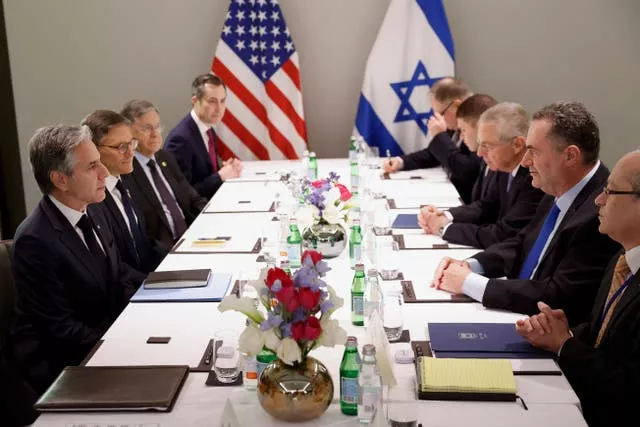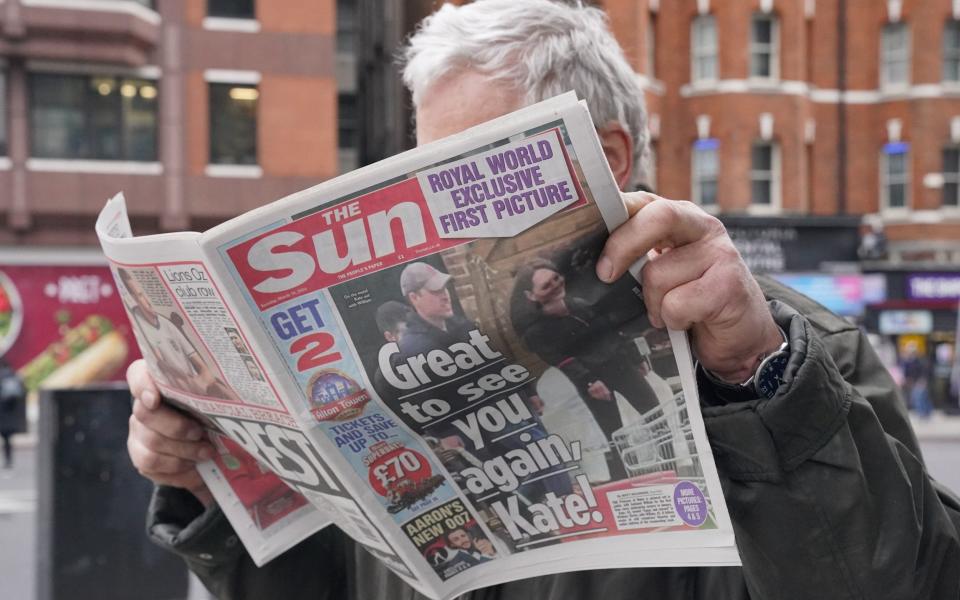US Secretary of State Antony Blinken held talks in Israel on Tuesday as he seeks a plan for Gaza’s post-war future.
The talks came as Israel’s military pushed ahead with its offensive in the beleaguered territory.
Heavy bombardment and fighting shook refugee camps, sending Palestinians scrambling to find safety and hampering aid groups’ efforts to get relief to the population.
Mr Blinken arrived in Israel after saying he had secured commitments from four Arab nations and Turkey to help in rebuilding Gaza after the war, something they had been reluctant to promise before a stop in fighting.
But the US and Israel remain deeply divided over how Gaza will be run when — and if — its current Hamas rulers are defeated.
US officials have called for the Palestinian Authority, which currently governs parts of the Israeli-occupied West Bank, to take over in Gaza and for negotiations to resume on the creation of a Palestinian state.
Israeli leaders have staunchly refused both.
Mr Blinken is also trying to prevent the conflict from spreading after an escalation in fighting between Israel and Hezbollah and threats by Israel to step up military action to put an end to almost daily fire across the border from Lebanon by the militant group.
The US has pressed Israel to scale down its offensive in Gaza to more precise operations targeting Hamas.
But the pace of death and destruction has remained largely the same, with several hundred Palestinians killed each day, according to health officials in Gaza.
Saudi Crown Prince Mohammed bin Salman and I met today in Al ‘Ula and discussed the importance of urgently addressing humanitarian needs in Gaza and preventing further spread of the conflict. pic.twitter.com/hHp3rml4Uq
— Secretary Antony Blinken (@SecBlinken) January 8, 2024
Israel has vowed to keep going until it has destroyed Hamas throughout the territory, in response to the October 7 attack during which militants killed some 1,200 people, mainly civilians, in southern Israel and kidnapped around 250 others.
After three months of fighting, Hamas has continued to put up a fierce resistance.
The Israeli military says it has dismantled Hamas infrastructure in northern Gaza, where large swaths of the cityscape have been demolished. But fighting continues there against what Israel says are pockets of militants.
The offensive’s focus has shifted to the southern city of Khan Younis, where ground troops have been fighting militants for weeks, and a number of urban refugee camps in central Gaza.
“The fighting will continue throughout 2024,” military spokesman Daniel Hagari said.
Throughout the night and into Tuesday morning, Israeli artillery shelling and gunfire echoed through the Nuseirat refugee camp in central Gaza, where troops have been pushing in from the north, said one resident, Saeed Moustafa. They were facing heavy resistance from gunmen in the camp, he said.
Like other refugee camps in Gaza, Nuseirat was built to house Palestinians who were driven out of homes during the 1948 war surrounding Israel’s creation, and over the decades it has been built up into a densely populated town housing refugees and their descendants.
Families in Nuseirat’s northern neighbourhoods were fleeing to other parts of the camp, Mr Moustafa said.
Some tried to head south on the Gaza’s main north-south road but found it blocked by Israeli tanks and turned around, he said. In leaflets, the military had told people to use another road, along the coast, to evacuate.

Further south in Khan Younis, warplanes struck multiple areas in and around the city.
“It was an intense night. Bombings didn’t stop,” said Gaber Abu Hamed, who fled his home in Gaza City in the north two months ago.
Since the war began, Israel’s assault in Gaza has killed more than 23,000 Palestinians, about two-thirds of them women and children, and more than 58,000 have been wounded, according to the Health Ministry in Hamas-run Gaza.
The death toll does not distinguish between combatants and civilians.
Nearly 85% of Gaza’s population of 2.3 million have been driven from their homes by the fighting, and a quarter of its residents face starvation, with only a trickle of food, water, medicine and other supplies entering through an Israeli siege.
The UN humanitarian office, known as OCHA, warned that the fighting in central Gaza was severely hampering operations to distribute aid.
Several warehouses, distribution centres, health facilities and shelters have been affected by evacuation orders from the military, it said.
Some bakeries in the central city of Deir al-Balah have been forced to shut down. A UN warehouse was hit last week, killing a worker, and five others were detained by the military, with two still being held.
In northern Gaza, which Israeli forces cut off from the rest of the territory in late October, tens of thousands of people who remain there face shortages of food and water.
The World Health Organisation (WHO) said on Sunday it has been unable to deliver supplies to northern Gaza for 12 days because of bombardment and the inability to guarantee safe passage with the Israeli military.
OCHA said the military rejected five attempted aid convoys to the north in the past two weeks, including planned deliveries of medical supplies and fuel for water and sanitation facilities.
As a result, five hospitals in the north have no access to supplies, tens of thousands are without access to clean water, and the risk of disease is mounting as sewage systems fail, it said.
On what is now his fourth trip to the Mideast since the war began in October, Mr Blinken met Israeli President Isaac Herzog on Monday ahead of talks with Prime Minister Benjamin Netanyahu, the War Cabinet and other officials.

Mr Blinken said on Monday that Saudi Arabia, Jordan, Qatar, the United Arab Emirates and Turkey have agreed to begin planning for the reconstruction and governance of Gaza once Israel’s war against Hamas ends.
Those countries had previously resisted U.S. calls for post-war planning to begin, insisting that there must first be a cease-fire and a sharp reduction in the civilian suffering in Gaza.
The countries’ leaders “agreed to work together and to co-ordinate our efforts to help Gaza stabilise and recover, to chart a political path forward for the Palestinians and to work toward long-term peace, security and stability in the region as a whole,” Mr Blinken said, after meeting Saudi Crown Prince Mohammed bin Salman in the western Saudi city of Al Ula.
Mr Blinken did not offer specifics on potential contributions. Financial and in-kind support from the UAE and Saudi Arabia could be essential to the success of any plan.
Any post-war plan for Gaza will require both Israeli and Palestinian agreement, but Mr Netanyahu and his government have their own ideas for Gaza’s future that the others will likely not accept.
Mr Netanyahu remains opposed to the concept of the two-state resolution to the Israeli-Palestinian conflict, something that Saudi Arabia in particular is demanding if it is to normalise relations with Israel.
Signup bonus from




